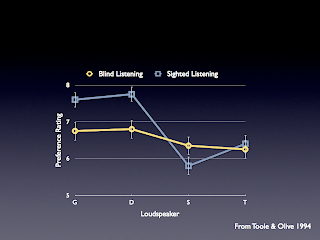I samme intervju er Holt inne på grunnen: den at HiFi er uærlig. Og som Sean Olive påpeker er det samstemt enighet blant produsenter og anmeldere om at man må unngå å tillate blindtester.
Her er Holt om "basic honesty controls":
Audio as a hobby is dying, largely by its own hand. As far as the real world is concerned, high-end audio lost its credibility during the 1980s, when it flatly refused to submit to the kind of basic honesty controls (double-blind testing, for example) that had legitimized every other serious scientific endeavor since Pascal. [This refusal] is a source of endless derisive amusement among rational people and of perpetual embarrassment for me..
Sean Olive (fra Harman) har gjort studier og kommet til at når folk vet hva de lytter til, så ignorerer de endringer i lyden, fordi de er så innstilte på å høre hva de forventer å høre:
http://seanolive.blogspot.com/2009/04/dishonesty-of-sighted-audio-product.html
The psychological biases in the sighted tests were sufficiently strong that listeners were largely unresponsive to real changes in sound quality caused by acoustical interactions between the loudspeaker, its position in the room, and the program material. In other words, if you want to obtain an accurate and reliable measure of how the audio product truly sounds, the listening test must be done blind. Its time the audio industry grow up and acknowledge this fact, if it wants to retain the trust and respect of consumers.
Førti Harman Kardon ansatte vurderer fire høyttalere. Man ser hvordan forskjellene forsvinner når de ikke vet hva de lytter til, og hvordan de foretrukne høyttalerne stikker av med seieren, når man vet det er disse man lytter til.
Dette utnyttes så i markedsføringen av hifi-komponenter, og lytterne er med på leken, kanskje uvitende om hvilken sterk rolle bias spiller.
(Sean Olive er sjefen for Acoustic Research på Harman Kardon. Hva faen vet vel han om audio?
http://www.aes.org/aes/seanolive)




